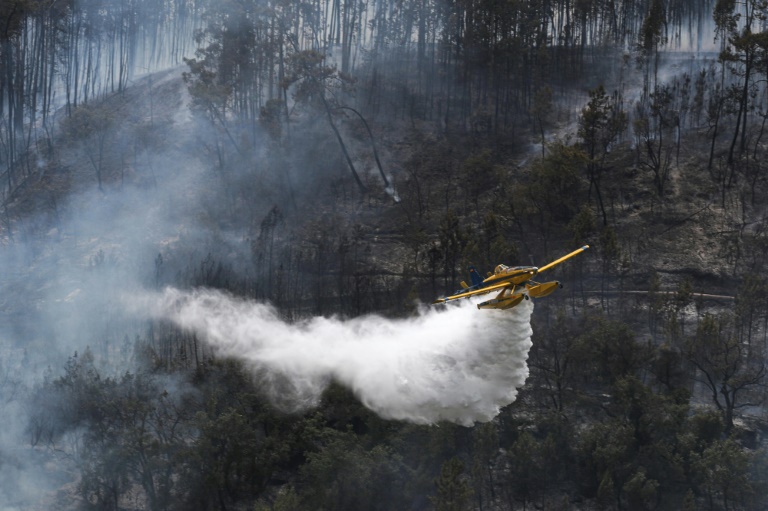France suffered soaring temperatures Wednesday, edging closer to the blistering heat already engulfing Spain and Portugal as wildfires destroyed vast stretches of Western European forestland.
Large parts of the Iberian Peninsula have seen temperatures surpassing 40 degrees Celsius (104 degrees Fahrenheit) this week.
In southwestern France a wildfire raging since Tuesday had ripped through 1,000 hectares (2,500 acres) of pine trees just south of Bordeaux by Wednesday, forcing the evacuation of 150 people from their homes.
Near the Dune of Pilat — Europe’s tallest sand dune — another fire consumed about 700 hectares of old pine trees, authorities said.
Regional prefect Fabienne Buccio told reporters the fires were spread out over five kilometres (three miles), fuelled by dried-out vegetation.
About 6,000 campers near the dune were evacuated overnight.
“I’ve worked here since 1988 and I’ve never seen anything like it,” said Corinne Hardoin who manages the “Flots Bleus” campsite next to the Pilat dune.
Further inland, 500 people were evacuated around the French village of Guillos as their homes came under threat from advancing fire.
– ‘It was scary’ –
“There were flames in the top of the trees 30 metres high,” mayor Mylene Doreau told AFP. “We could see them moving towards the village, it was scary.”
Some 600 firefighters have been battling the blazes in the region, aided by waterbomber aircraft.
Some cities, including Toulouse and Lourdes, have made changes to Thursday’s Bastille Day celebrations to limit the risk of accidental fire. Nimes simply cancelled the traditional fireworks altogether.
The prefect of the Paris region, meanwhile, cut the speed limit on motorways and expressways to limit air pollution.
Spectators at the annual Tour de France, which is currently crossing the French Alps, put on a brave face as they watched the competitors negotiate some of the bike race’s most difficult climbs in the blazing sunshine.
“It’s absolutely worth it,” said Frances Carr, a 48-year old Australian. “We’ve come a long way to see this, it’s marvellous.”
French student Jean Gosselin, 18, felt mostly for the Tour riders: “They really feel the heat. I’m just standing here watching.”
– ‘Expect it to worsen’ –
Heatwaves have become more frequent due to climate change, scientists say.
The last one to hit France, Portugal and Spain happened only last month.
“We do expect it to worsen,” World Meteorological Organization spokeswoman Clare Nullis said Tuesday.
Last week an avalanche triggered by the collapse of the largest glacier in the Italian Alps — due to unusually warm temperatures — killed 11 people.
The high temperatures are expected to spread to other parts of western and central Europe in the coming days.
Britain issued an “amber” alert — the second highest of three levels — which indicates that the extreme heat will have a “high impact” on daily life and people.
A UK climate official said there was a growing chance of a new UK record, beating Britain’s highest temperature recorded on July 25, 2019 at 38.7C at Cambridge Botanic Garden, in eastern England.
In Spain highs of up to 44C are expected in Guadalquivir valley in Seville in the south in coming days.
Spain’s health ministry said people should drink plenty of fluids, wear light clothes and stay in the shade or air-conditioned rooms to avoid their “vital functions” being affected.
– ‘A bit oppressive’ –
The Aemet meteorological agency said parts of Spain were “suffocating”, especially Andalusia in the south, Extremadura in the southwest and Galicia in the northwest.
Those areas were placed on high alert, and travel was not advised “unless strictly necessary”.
Between January 1 and July 3, more than 70,300 hectares of forest went up in smoke in Spain, the government said — almost double the average of the last ten years.
Authorities in Portugal said one person had died in forest fires, after a body was found in a burned area in the northern region of Aveiro.
The whole country is under a “situation of alert” for wildfires that have raged for days and are forecast to go on until at least Friday.
Portugal was expecting two water-dropping planes from Italy Wednesday, and two more from France later to help battle the flames, the civil protection agency said.
“Portugal is experiencing a period of maximum risk of fires, and unfortunately on many fronts,” tweeted Prime Minister Antonio Costa.
The situation is stirring memories of devastating wildfires in 2017, which claimed the lives of over 100 people in Portugal.
In Greece meanwhile, a firefighting helicopter helping to fight a forest blaze on the island of Samos Wednesday crashed into the Aegean Sea with at least three people on board, said the fire service.
A rescue operation was underway, they added.
burs-jh/jj









